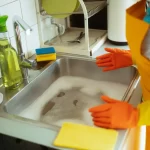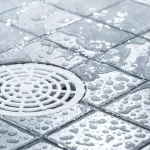As the harsh winter chill gives way to the milder breezes of spring, Toronto homeowners are emerging from a season of frozen pipes, burst water lines, and other cold-weather plumbing challenges. With summer on the horizon, it’s crucial to address the new set of plumbing issues that warmer temperatures can bring. The rising heat and increased water usage during the summer can put additional strain on your plumbing system, making it essential to prepare your home for the upcoming season.
Here’s a detailed guide to ensuring your plumbing is in top shape for summer, covering everything from drain maintenance to basement waterproofing and backwater valve inspections.
1. Check Your Drains
Increased Water Flow
Summer typically sees a surge in water usage. From frequent showers to backyard barbecues and gardening, your drains are working harder than usual. This increased flow can lead to clogs and slow drainage, particularly if your drains have been compromised or if there’s a buildup of debris.
- Identify Common Drain Issues
- Slow Drains: If you notice that your sink or shower drains are sluggish, it could be a sign of a developing clog. Over time, hair, soap scum, and other debris can accumulate, causing blockages.
- Gurgling Noises: A gurgling sound from your drains often indicates a problem with the venting system or a partial blockage. This can affect the efficiency of your plumbing system and may lead to more significant issues if not addressed.
- DIY Drain Maintenance
- Use Drain Screens: Install drain screens or catchers to prevent hair and large particles from entering your drains. Regularly clean these screens to keep them functioning effectively.
- Home Remedies: A mixture of baking soda and vinegar can help to break down minor clogs. Pour half a cup of baking soda followed by half a cup of vinegar down the drain, and then flush with hot water after 15 minutes.
- Professional Drain Inspection
For persistent or severe problems, it’s best to consult a professional plumber. Modern plumbing services include video camera inspections that allow plumbers to see inside your pipes and pinpoint the exact location of clogs or damage. This technology enables a precise and effective resolution, minimizing disruption and avoiding the need for invasive procedures.
2. Assess Your Basement
The Importance of Waterproofing
A well-maintained basement is crucial for preventing water damage, especially after a wet spring. Proper basement waterproofing can also help you save on energy costs throughout the year. Damp basements can lead to higher cooling and heating bills due to poor insulation.
- Inspect for Moisture and Mold
- Dampness: Look for signs of moisture on walls, floors, and corners. Persistent damp spots can indicate inadequate waterproofing or drainage issues.
- Mold and Mildew: Mold growth is a serious concern and can affect indoor air quality. If you notice a musty smell or visible mold, it’s essential to address the problem immediately.
- Improve Basement Waterproofing
- Seal Cracks: Inspect your basement for any cracks in the foundation or walls. Use a concrete sealant to fill these gaps and prevent water from seeping through.
- Install a Dehumidifier: A dehumidifier can help control moisture levels in your basement, reducing the risk of mold growth and maintaining a more consistent temperature.
- Energy Efficiency
- Insulation: Proper insulation in your basement can help regulate temperature and improve energy efficiency. Insulated walls and floors can keep your basement cooler in the summer and warmer in the winter, reducing the strain on your heating and cooling systems.
For a comprehensive assessment and solution, consider hiring a basement waterproofing expert. They can evaluate your basement’s condition, recommend appropriate improvements, and ensure that your home remains protected against water damage.
3. Verify Backwater Valves
Preventing Water Backflow
Older homes, in particular, may lack modern backwater valves, which are essential for preventing water from backing up into your home from the city’s sewer system. This is especially important during heavy rainfall or when the city’s sewer system is overloaded.
- Understanding Backwater Valves
Backwater valves are designed to prevent sewer water from flowing back into your home. They work by allowing wastewater to exit your home while blocking any potential backflow. This is crucial for protecting your home from sewage backups, which can be both damaging and unsanitary.
- Check for Proper Operation
- Inspection: Regularly inspect your backwater valve to ensure it’s functioning correctly. Look for signs of wear, corrosion, or damage.
- Maintenance: Backwater valves require periodic maintenance to ensure they operate effectively. This may involve cleaning the valve and checking for blockages.
- Installing or Upgrading Backwater Valves
If your home doesn’t have a backwater valve, or if your existing valve is outdated, consider installing a new one. A professional plumber can help you select and install the right valve for your home, ensuring that it meets current standards and provides adequate protection.
Additional Tips for Summer Plumbing Preparation
Inspect Outdoor Plumbing
- Garden Hoses and Faucets: Disconnect and store garden hoses when not in use. Inspect outdoor faucets for leaks or damage, and repair or replace them as needed.
- Sprinkler Systems: Check your sprinkler system for leaks or clogs. Ensure that it’s functioning properly and efficiently.
Monitor Water Usage
- Check for Leaks: Regularly inspect your home for any signs of leaks, such as damp spots, mold, or increased water bills.
- Conserve Water: Implement water-saving practices, such as fixing leaks promptly, using water-efficient fixtures, and being mindful of water usage during peak summer months.
Consider a Plumbing Inspection
A comprehensive plumbing inspection by a licensed professional can identify potential issues before they become major problems. This proactive approach can help you address any hidden problems and ensure your plumbing system is in optimal condition for the summer.
Conclusion
Preparing your plumbing for summer involves a combination of routine maintenance and proactive measures. By checking your drains, assessing your basement waterproofing, and verifying the operation of your backwater valves, you can ensure that your home is well-prepared for the warmer months. Additionally, inspecting outdoor plumbing, monitoring water usage, and considering a professional plumbing inspection can further enhance your home’s readiness.
For expert assistance and peace of mind, contact Absolute Draining & Plumbing. Our team of licensed Toronto plumbing professionals is here to help you address any plumbing concerns and ensure that your home remains in top condition throughout the summer and beyond.






